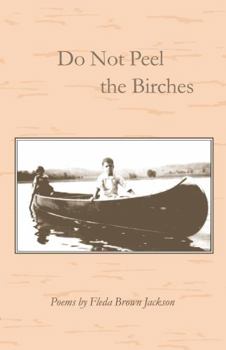Do Not Peel the Birches
In her second collection of poems, Fleda Brown Jackson holds with a meditative rapture to the place she call home - home as family, the source of trouble and joy; home as the embellished stories of family; and home as a place called Central Lake. And when the poems move outward - to Stonehenge, Edinburgh, Kitty-Hawk, Roanoke, St. Pete Beach, and the Mississippi River - the past keeps resonating. At last, the voice that remembers becomes nothing but a riding, a hunger. If I were a swan, she imagines, "The world would move / under me / and I would always be exactly / where I am." There is an end to history, Jackson says, when at last real life and art are able to merge: a mythic Elvis steps out of her ancestral outhouse, and his singing sounds very much like her own voice. "It's not as if one vent stands / beside another, separated by a delicate / membrane," she writes in another poem. It's "all done through images, the blood of fear, / of rage, soaking through the towel."
Related Subjects
Poetry




